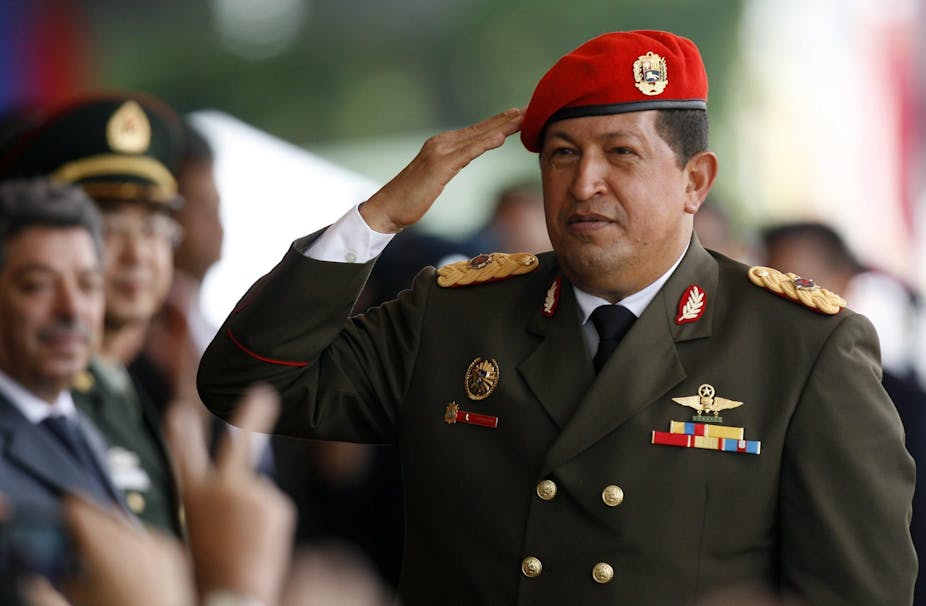So Hugo Chávez is dead. After rumour upon rumour swirling over past months, including a claim last week from the former ambassador of Panama that Chavez had actually died on 30 December, this morning Venezuelan vice-president Nicolas Maduro formally announced Chávez’s passing, at the age of 58, following a long battle with cancer.
You can expect the think-pieces on Chávez’s legacy to begin to flow in no time at all. Take them with a grain of salt. While in the mainstream media, Chávez was all too often presented as some sort of villain, he was a more complex figure than this.
This complicated legacy is no more evident than in his relationship with the international left.
Chávez and the international left
Chávez’s election to presidential office in 1998, with 56% of the popular vote, saw the beginning of the Latin American “pink tide” - a move to the left across the region, so named as the tide was not “red” - that is, communist - but the lighter “pink” - socialist.
The international left saw great promise in Chávez’s victory - a clear “no” to the Washington Consensus and its imposition of US-style capitalism, open markets and privatisation.
Here was a leader who was willing to take a stand against the creep of neo-liberalism, and offer a new way of thinking about how to live politically.
The good
Chávez lived up to his promise in many ways. The left admired many of his successes, such as bringing down unemployment and increasing the life chances and material wealth of the poor through high investment in education and health.
More exciting was his style of “participatory democracy”, seen in the building of the Bolivarian Circles and Communal Councils, which were decentralised, loose-knit political organisations of workers’ councils that deliberated on important local issues like health and water.
As Steve Ellner has written, there is little doubt that Chávez brought about “the mobilisation and incorporation of massive numbers of the formerly marginalized in the decision-making process”.
Titans of the academic left were quick to befriend or praise Chávez. Noam Chomsky visited Venezuela and claimed, “the transformations that Venezuela is making toward the creation of another socio-economic model could have a global impact if these projects are successfully carried out”.
Ernesto Laclau also visited Chávez and offered his full support to his Bolivarian project. Slavoj Žižek admired Chávez’s willingness to grab state power for the left.
The bad
Yet with the good comes the bad. As Chávez’s time went on, those on the left who defended liberal democracy became wary about some of his abuses of power.
Amongst other issues, he concentrated power in the executive, successfully increased the term limits for the president, allegedly withheld social insurance from supporters of opposition parties and closed down opposition television stations.
Chomsky turned on his friend, claiming that Chávez was leading an assault on democracy.
The president’s demonisation of his enemies also became wider, more vitriolic and worrying. While Chavez’s original targets were the old party elites, he went on to target the domestic opposition, then finally the “imperialist conspiracy” spearheaded by the United States.
The conspiracy mindset was nicely illustrated by assertions this morning that Chávez was “attacked by disease” by the US, something Chávez himself suggested in 2011.
Beyond this, Chávez got friendly with leaders who were no friends of democracy or the left, including Mahmoud Ahmadinejad, Bashar al Assad and Moamar Gaddafi, who he called “a great fighter, a revolutionary and a martyr”.
The legacy
Chávez’s legacy will remain mixed. There will be those who celebrate the man’s great achievements, his ability to envision and attempt to put into place “another world”, and his wider attempt to lead the Bolivarian Revolution in Latin America. There will be those who turn their attentions to other Latin American leaders in his wake, such as Evo Morales of Bolivia, or Rafael Correa of Ecuador, as paragons of radical socialism.
There will also be those who remember Chávez as a ruthless authoritarian leader, a “Marxist tyrant” or “communist dictator”. They will point to his abuses of the liberal safeguards of liberal democracy, his muzzling of the press, and his thirst for power.
The real answer probably lies somewhere in between the two extremes. While the left found a hero initially in Chávez, it became harder and harder to defend him, to look the other way as his time in office went on. As Latin American scholar Kirk Hawkins put it, Chavez’s was “a semidemocratic regime headed in an increasingly authoritarian direction”.
While Chávez will likely be remembered in the Western media for calling George W. Bush “the devil” at the United Nations in 2006, there is much more to the man. In remembering Chávez, the left will continue to have conflicting feelings about how their poster boy fell from grace.

